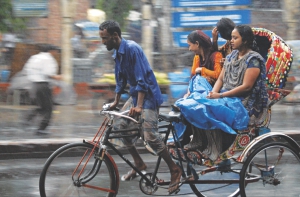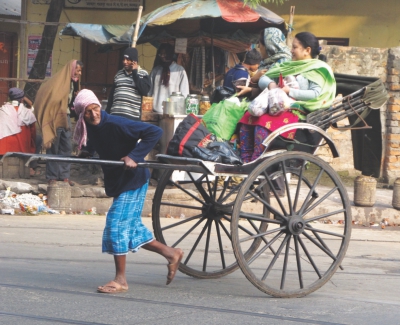| Home - Back Issues - The Team - Contact Us |
 |
| Volume 11 |Issue 50| December 21, 2012 | |
|
|
Food for Thought Twin Cities Farah Ghuznavi I have been thinking quite a lot, following a recent trip, about the inevitable comparisons between two cities, both of which I love. These are places that have a lot in common: a language, an attitude, certain bad habits, and an undeniable cultural and culinary affinity. Full marks if you have already guessed that I'm talking about Epar Bangla and Opar Bangla - or, more precisely, Dhaka and Kolkata.
Some of the similarities must be self evident - not least the ones already mentioned - but on closer inspection, there are more surprises to be had. The differences, on the other hand, are perhaps more easily explained, though not all of them. For one thing, I have often wondered why it is so much easier for women to go about their business on the hectic streets of Kolkata, than it seems to be for their counterparts in Dhaka. In fact, Kolkata has long been one of the safest cities in India for women. The same alas cannot be said of Dhaka, in comparison to the rest of the country. But Kolkata is changing, as is the rest of India. In an era when more women are out on the streets, and at later hours -- many for work -- there is a disturbing trend of attacks against women in public spaces. And following media headlines more generally, there is the sense of a society in the throes of transition, with an enormous generation gap evident on issues such as love and marriage, for example. Even more telling are the sensational crime stories on offer. On the one hand, there have been a number of reported instances where a group of so-called friends has kidnapped one of their own and demanded a ransom. On the other hand, there is the horrified response from wider society that such a thing could happen. Part of this can be attributed to a very twisted response to an uneven process of globalisation and the rise of unprecedented consumerism: a sort of combination of bad ideas and greed which is manifesting itself alongside a lamentable lack of common sense, let alone common decency. Looking at some of the headlines right here in Bangladesh, that's clearly not something the new India has a monopoly on. But to move into a lighter key, the desire to appear modern - and often, 'Western' - is having some bizarre side-effects in our part of the world. Like the somewhat fascist policy taken by one of the multiplexes I visited in Kolkata where it was clearly announced (through ubiquitous signage and a rather heavy-duty 'security' presence) that customers could not take food purchased elsewhere into the cinema hall with them. There are certainly cinema complexes in the Western world that have similar rules, and tend to be places that I generally avoid, because I don't particularly want my viewing experience to be that carefully micro-managed. I must admit however, that at no other cinema hall anywhere have I ever experienced ushers who actually rifle through your bag to make sure that you have no food in it!
As my mother found out during her recent trip to the same multiplex. After establishing that she had no significant amounts of food on her person (since that would clearly constitute a threat to the economic survival of the cinema!), the woman conducting the search managed to find three small mango candies lurking in the folds of my mother's handbag. Embarrassed, the investigator nevertheless insisted that my mother had to 'declare' the candies and leave them with her, to be picked up after the film was over. When my disobedient parent refused, the lady then suggested that my mother stand there and eat all three of the mango candies before going into the hall. When my mother flatly refused to do that and suggested that the woman just keep the candies for good, she said she was not allowed to do that! This has to be one of the most Kafkaesque examples of British-influenced bureaucracy, and - married with wanna-be modernity -- results, predictably, in utter stupidity. While on the subject of stupidity, I must touch upon Mamata Banerjee. Although this trip took place within the first year of Didi's rise to power in West Bengal, it was clear she had already developed a bad case of vertigo as a result of ascending to such heights. Her symptoms manifested in an insistence on painting everything blue-and-white (an obvious priority for any new administration in a state like West Bengal), a denial that rape cases could take place under her administration (a claim which, if true, would have made her administration truly unique in a global context) and a general bad grace towards any critics. As Ruchir Joshi put it in his open letter to the Chief Minister, she had managed to do more damage in 34 weeks than the Communists had managed in 24 years. Mind you, there are still some lingering remnants that represent the values of the old Calcutta. Those who enjoy fine dining in restaurants like Tamarind will - on their way to those establishments - pass the endearingly titled "Tintin Economic Chinese Restaurant", and my personal favourite, "Peep 'n Inn Fast Food", which continue not only to survive, but to thrive. And the bookstores are booming, even if many of them are located in the equally booming and very shiny malls. Furthermore, some of the clothing on display, worn by happy passers-by, remains reassuringly Bengali and incurably unfashionable. I had an undeniably glorious time browsing the bookshops at every opportunity, despite my tiresome family dragging me off in various other directions. And on every occasion when I found a copy of my friend Mahmud's Rahman's recent translation of Mahmudul Haque's "Black Ice" in a bookstore, I made sure to remove it from its place in the bookshelf and display it prominently so as to catch the eye of passing customers. Must do a little promotion of Epar Bangla while in Opar Bangla, right? The supermarkets were more of a challenge. Here, I must admit that Kolkata has done a much better job of emulating the West than they have in terms of the Cineplex 'food security' policy. The range of goods is massive and reminiscent of American supermarkets, even unto the innumerable varieties of the same/very similar product on display. I will shamefully admit that it took me a good five minutes to choose some chanachur - and that was despite already knowing that I was looking for something from the excellent Haldiram's range! After a challenging twenty minutes of supermarket shopping, we decided to reward ourselves for emerging with our sanity, if not our wallets, intact. That's when we faced the next challenge. Frankly, I was looking for a straightforward flavour like butterscotch. That wasn't on offer, and its equally simple counterpart, vanilla, was sold out. Instead, we were offered a bizarre if creative range of flavours that included green coconut (I tried some, being a fan of daab - bad decision), paan (this one I refused, not even liking paan in its original form) and nolen gurer shondesh (which my mother went for, and said was excellent). In the end, I played it safe and went for South Indian Coffee ice cream, which was very good. But it brought home to me that there is such a thing as too much choice, no matter what the marketing pundits tell you. And of course, sometimes the simple things in life are the most important. Which is probably why the most important difference I would identify right now between Kolkata and Dhaka is that what they call power cuts in Kolkata are laughably inferior to our national efforts in this regard.
|
||||||||
Copyright
(R) thedailystar.net 2012 |

